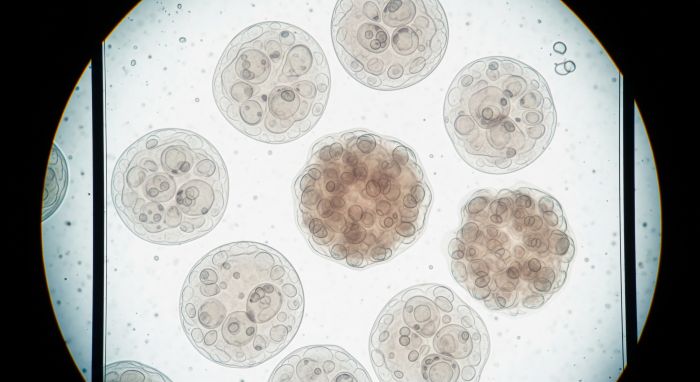
Family Planning and Preservation:
Embryo freezing
.svg)
























What is embryo freezing?
What are the benefits of freezing embryos vs eggs?


The embryos have already passed successful fertilization, they allow for pre-implantation genetic study, and couples can plan families together.
How long can embryos be frozen?


Embryos can remain frozen indefinitely, without further deterioration in quality. Viability remains constant as long as they are stored at -196°C.
Does freezing the embryo have any repercussions on the baby at birth?


No, it has no negative impact on babies when they are born. Studies on this are reassuring.
How many embryos do I need to freeze to secure a baby?


It depends on embryonic quality and age. With good quality embryos <35 years old, 2-3 blastocysts may be sufficient. At >38 years of age or reduced quality, 4-6 embryos may be needed.
What if I never use one or more embryos?


They can be donated to other couples or for research purposes; either way, it's completely up to you and your partner to decide.

Your reproductive plan starts here
Let's start your journey!
Comprehensive evaluation of the couple


We perform a complete evaluation of female and male fertility. We determine the optimal stimulation and fertilization protocol according to the individual characteristics of each couple.
Specialized IVF cycle


Personalized ovarian stimulation for 10-15 days, monitoring using ultrasound and hormonal analysis, follicular puncture under sedation, and in vitro fertilization or ICSI according to sperm quality to create viable embryos.
Embryo culture


Embryos are grown in incubators that are monitored without disturbing their development. We evaluate daily progression to blastocyst status (day 5-6) to identify embryos with greater implantation potential.
Vitrification and safe storage


The best embryos are vitrified and stored in liquid nitrogen tanks at -196°C with monitoring systems.
Planning for future transfers


When they decide to use their embryos, we coordinate endometrial preparation, the optimal time for the transfer, specialized monitoring of the pregnancy and preservation of additional embryos for future siblings if they wish.
What do we offer you?
Embryology Laboratory

All-inclusive experience

Cryobiology Laboratory

Preimplantation genetic analysis
IVF after 40 - Join us!

Talk to a consultant.
Talk to a consultant.
Schedule an appointment..png)
Paternity test?
Take a quiz!.png)









.png)





.svg)
.svg)